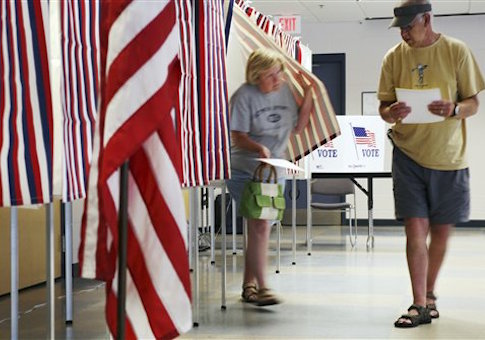Lost amidst the noise following the Nov. 8 elections is the passage of a ballot initiative that fundamentally changes the way democracy works in the state of Maine.
The measure requires Maine to adopt a system in which voters elect state and federal officials by ranking candidates in order of preference. Following a complicated multi-round process, a winner would be selected, rather than the single-round system currently used in most of the country.
While several U.S. cities such as San Francisco and Minneapolis have implemented ranked-choice voting, Maine will become the first U.S. state to do so.
Kyle Bailey, campaign manager of the Committee for Ranked Choice Voting, told the Washington Free Beacon that the measure would restore majority rule by ensuring that the candidate who captures the most votes takes office.
For example, if three candidates are in the running for governor and no one wins a majority of votes after the initial count, the least popular candidate is knocked out, and those votes are reallocated to the other two candidates in the next round. The cycle continues until a candidate wins the majority number of votes.
Bailey compared the system to ordering off of a menu at a restaurant.
"We rank choices every day of our lives. If I go to Dunkin' Donuts and they are out of a multigrain bagel, I get a garlic bagel. I know what my second choice is," Bailey said.
The measure is expected to benefit third-party candidates by eliminating the so-called "spoiler effect." Bailey said this allows voters to avoid choosing the "lesser of two evils" and instead cast a ballot without feeling as if they’ve thrown away their vote. Supporters also say the system discourages extremists from running because politicians are forced to appeal to voters outside of their base.
Opponents meanwhile say the system is too convoluted for voters who may become confused by having to rank their candidate preferences.
Republican Gov. Paul LePage, who won the 2010 and 2014 gubernatorial races without capturing a majority of votes, said the measure violates Maine’s Constitution, which says the governor and state legislators must be elected by a plurality of votes.
On the federal level, courts in four states have ruled that it is constitutional and upholds the principle of "one person, one vote."
Bailey said over the past week he’s been contacted by people from both political parties across the United States who believe similar election reforms could help fix the "broken" system.
Fourteen states considered bills related to ranked choice voting during the 2016 legislative session, though none of those measures passed, PBS reported in September.
